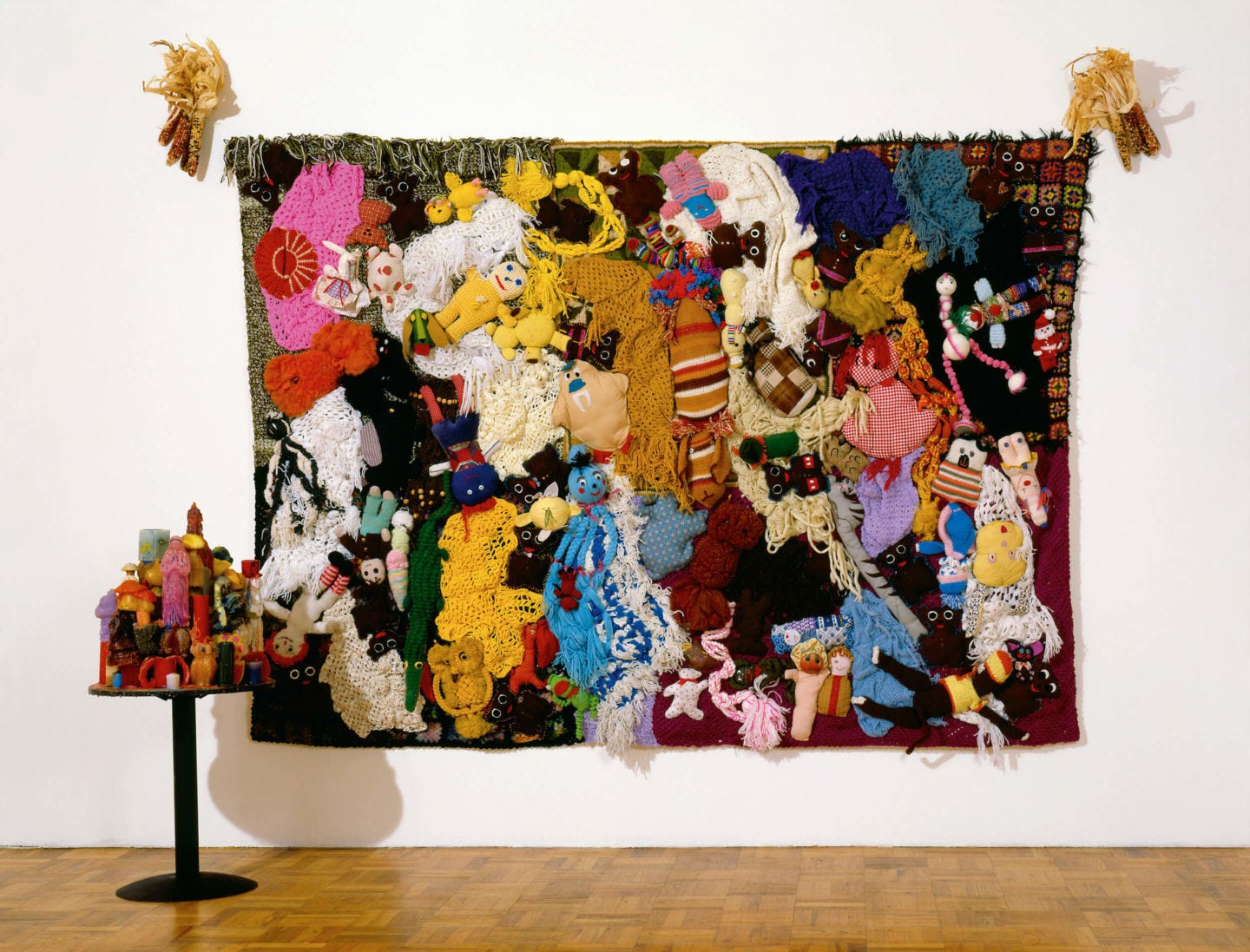what we find in other people
Mike Kelly, More Love Hours than Can Ever Be Repaid and The Wages of Sin, 1987
I’ve been telling friends lately that the three most lucrative things you can be obsessed with are people, technology and money. You can be interested in all three, but you can really only be truly obsessed with one. For me, it’s always been people. When I was a kid I could barely talk to anyone else, so I spent all my time reading. But looking back I think my love of books stemmed not from a love of language (though I do love language), but from an interest in other people’s interiority. I wanted to know what other people experienced, and what they felt, and how they thought. And fiction was—still is, in my opinion—the best way to investigate that.
As time goes on, I've asked myself more and more why I’m so interested in people. As in: what do I actually want from them? I think when I was younger I wanted to understand them because I felt alone and wanted to be loved. Now, I feel more and more that if you’re trying to get something from another person, you’re already fucking up. What people offer, in and of themselves, is the chance to get out of your own skin. Their existence is both a consolation and a source of hope.
I told a friend recently that I’m often reassured by the ordinariness of my own experience. The truth is, my life has been pretty odd for a long time, and there was a stretch of several years where I felt alienated by the weirdness of my own choices. But when I wrote, and especially when I read, I realized that every thought and feeling I’ve ever had has already been experienced by lots of other people. My experiences were immensely relatable.
There is some criticism of millennials that goes, This is the snowflake generation, because they’ve been raised to believe they were special. I’m not sure this is true, but moreover I think there’s something so terrible about believing that you’re special. Not terrible morally—terrible for you. Because if you think you’re special, you separate yourself from others. And in so many ways I think that psychological separation is the source of all our suffering. When you believe that you are ordinary, you believe that your problems are shared and therefore surmountable. You believe that your triumphs mean something to someone else. And as a result your life improves immensely.
Adam Curtis likes to say that there is no putting hyperindividualism back in the box. I agree with that. I think the biggest question of our times is whether it’s possible to marry individualism and collectivism, and if so how? How do we come to believe that our lives are our own, but also that we are responsible to others? And what are the actions that would follow from that belief?
I’m haunted by this Terrence McKenna quote:
I think the real test of psychedelics is what you do with them when you're not on them, what kind of culture you build, what kind of art, what kind of technologies... What's lacking in the Western mind is the sense of connectivity and relatedness to the rest of life, the atmosphere, the ecosystem, the past, our children's future. If we were feeling those things we would not be practicing culture as we are.
Connectivity, relatedness. What I need from other people is really just the knowledge that they are there. I was talking to someone a couple days ago about Simone Weil’s definition of love: It is an act of cowardice to seek from (or to wish to give) the people we love any other consolation than that which works of art give us. These help us through the mere fact that they exist. Of course, this is a pretty extreme position, and unrealistic in the sense that we are all driven by the desire to talk to people and touch them and live with them. But I’m sustained by the belief that connectivity exists separate of my own life and relationships. Terence: I am human, therefore nothing human is alien to me.
I don’t think there’s anything more meaningful than realizing that your experience is the human experience, that what happens in your own head is only a fraction of the whole. That the whole exists. I think the awareness of that whole is the opposite of the nihilism that suffuses Western culture today. That’s why psychedelics help people: they’re the only thing that consistently shifts people’s metaphysical views of the world, other than religious conversion. You felt atomized before, and now you don’t. There is no price I could ever put on that. The way I used to relate to people was so much about completion, about craving. I didn’t understand that you can never get enough of something you don’t really need. If you’re blind to the wholeness that’s already present, you’ll never find it in other people. When you see it you’ll see it in everyone.



'The way I used to relate to people was so much about completion, about craving. I didn’t understand that you can never get enough of something you don’t really need. If you’re blind to the wholeness that’s already present, you’ll never find it in other people. When you see it you’ll see it in everyone.'
Never been able to articulate it so succinctly before so thankyou, coming to this realisation was such a significant psychological transition for me, probably the biggest turning point in my life.
so beautiful ava 😭 thank you